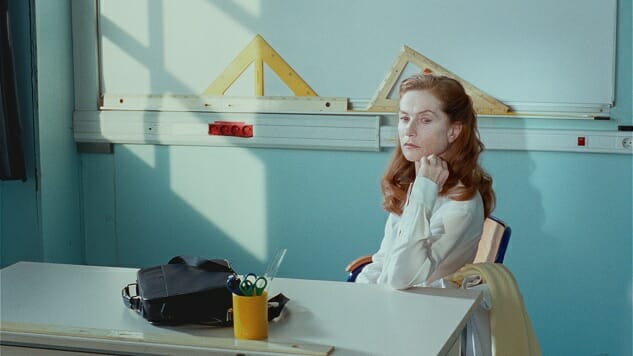There are problems with Mrs. Hyde that have nothing whatsoever to do with Bozon’s puzzling creative choices, though for perspective’s sake, the problems are dwarfed by the choices. Yes, the film hinges on a matter of split identity, and yes, the split identity hinges on some mad science. Bozon’s protagonist, Marie Géquil (Isabelle Huppert), is a mild-mannered high school physics professor scoffed at by her peers, bullied by her students and unquestioningly devoted to her profession. Then, while conducting an ill-advised late night experiment in her laboratory, she is struck by lightning and subsequently develops a dual personality, the Mrs. Hyde of the title. The change in her registers at first as odd, and then as troubling, as the meek Géquil slowly develops a backbone nobody who knows her thought she possessed.
The similarities between Bozon’s film and Robert Louis Stevenson’s The Strange Case of Dr. Jekyll and Mr. Hyde end there. Mrs. Hyde is Stephenson adjacent, such a massive departure from the book that claiming The Strange Case of Dr. Jekyll and Mr. Hyde as inspiration feels like a bluff, and when you’re veering that far away from your adapted text, then what the hell’s the point? Where Edward Hyde took over the body of his host, Henry Jekyll, in the wee hours to go about London stomping on children and acting like an all-purpose asshole, Mrs. Hyde takes over Géquil and she…sits on a bench by the road. Granted, she also glows hot orange instead of shapeshifting into an unruly and diminutive man, and after a while she begins roasting people and dogs alive when the spirit moves her. (Maybe she is kind of an asshole.) In keeping with traditions of French cinema and with Bozon’s own deadpan aesthetic, that’s about all she does, though, which effectively renders Mrs. Hyde aloof at worst and inscrutable at best (and occasionally comical in between, because why not).
None of these choices are unappealing, either individually or together. It’s just that they never come together to form a greater statement about anything that transpires in Mrs. Hyde’s plot. The foundation of the film is Géquil’s timidity: She’s a human doormat, a ghost at the edge of her students’ awareness, shyly pleading for order on the other side of their static. She’s always just out of range of their attention. Her husband, Pierre (José Garcia), notices her, but struggles to get her to notice him in one of Mrs. Hyde’s more compelling role reversals. Her boss, the school principal (Romain Duris), notices her, too, but he’s a blowhard and a boor, incapable of carrying out a conversation with anyone on any subject without appointing them backhanded compliments or blundering through accidental racism.
You expect Géquil, in the guise of Mrs. Hyde, to have something, anything to say about how the world treats her as much as you expect Bozon to have some kind of perspective on his movie’s ideas and politics. Mrs. Hyde is a staunchly and intentionally political piece of art, after all, being concerned with the alienation and neglect of women in the workplace, marginalization of minority students whose lives are predestined by their white custodians and with evolving gender roles. Pierre is a househusband, deeply in love with Géquil but often at a loss as to how to please her, make her happy or, failing all of that, at least get her to take off her blinders and just see him. She’s routinely preoccupied with her thoughts, and she would be: Her day to day leaves her with much to think about, very little of it good.
The other man in her life is Malik (Adda Senani), one of her students, a young fellow with great promise but bad taste in friends. He hangs with dropouts at nearby public housing, which means of course that they’re a bunch of roughs rapping verses about their hard luck lives. Géquil shows Malik better living via science, recalling films like Stand and Deliver and Dangerous Minds, but the payoff to this thread is muted as with everything else. It’s hard to get a firm sense of how invested Bozon is in Malik’s arc, or in his mentee-mentor relationship with Géquil. Assigning agency to directors is a staircase to Hell, but Mrs. Hyde is so detached that it’s hard not to wonder if Bozon spent the entire shoot bored out of his mind. The whole exercise is drowned in ambivalence.
A movie where Huppert’s character nearly goes full-Johnny Storm in appearance shouldn’t be ambivalent about anything. It likely goes without saying that Huppert is superb, much as water is wet and the sun is hot, but there you have it: She very nearly elevates the film just by doing what she does, sculpting her dignified humanity to fit the mold of Mrs. Hyde’s 1950s sci-fi evocations. Géquil’s nighttime constitutions, capped off by conflagration, are straight out of the classic genre playbook, hinting at a movie in the “science gone wrong” tradition. Like Bozon’s themes, this element never goes anywhere worth visiting. The absence of realization—of motifs, of political sentiment, of the basic pleasures of science fiction—will make you wish Bozon had just stuck to Stevenson’s script.
Director: Serge Bozon
Writer: Serge Bozon
Starring: Isabelle Huppert, Romain Duris, José Garcia, Adda Senani
Release Date: April 27, 2018
Boston-based culture writer Andy Crump has been writing about film and television online since 2009, and has been contributing to Paste since 2013. He also writes words for The Playlist,WBUR’s The ARTery, Slant Magazine, The Hollywood Reporter, Polygon, Thrillist, The Week, and Vulture, and is a member of the Online Film Critics Society and the Boston Online Film Critics Association. You can follow him on Twitter and find his collected writing at his personal blog. He is composed of roughly 65% craft beer.
